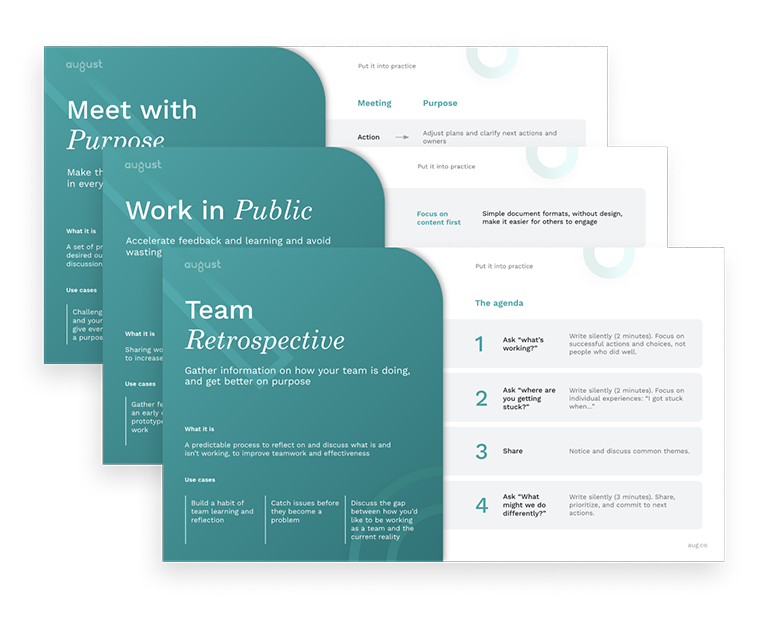Published May 27, 2022 | Updated August 3, 2023 | 4 minute read
I’m not a fan of the “either-or” binary. Most either-or situations are a lot more nuanced and subjective than this phrasing allows.
And like most binaries, either-or thinking can perpetuate toxic behaviors and keep us from learning and growing.
But sometimes we do have to choose between two good things when they’re at odds with each other. Either this or that.
This is especially true in the context of hybrid work.
These days, companies often feel like they have to choose either…
- Flexibility or availability
- Collaboration or efficiency
- Covid safety or in-person community
When everything on the list is a good thing, how do you pick which is more important to your organization?
To start, try reframing two conflicting virtues not as an either-or, but as an even-over.
Even-over replaces the binary with a priority system that allows for more nuance and openness in designing hybrid solutions.
When you have to choose between Good Thing A and Good Thing B, even-over framing will help you decide which thing to prioritize even over the other.
Here are a few examples that I’ve found to be crucial to a healthy, equitable hybrid work environment.
1. Inclusive even over efficient
Inclusive practices take longer. They just do.
Inviting and listening to multiple, divergent viewpoints requires time and energy that many leaders believe they can’t afford.
But in a hybrid work environment, the identity-based biases we already carry into the workplace – like racial bias, gender bias, and disability bias – get compounded by new factors like proximity bias and familiarity bias.
This means that in hybrid settings, people with power are more likely to ignore marginalized and unconventional perspectives in the name of efficiency.
But the success of hybrid work depends on having diverse perspectives in the mix.
You can’t know what’s working and what needs improvement if the people most sidelined by the “new normal” don’t get a chance to share.
Choose to be inclusive, even over efficient. Slow down the conversation in order to make sure all voices are heard.
2. Equitable even over equal
No hybrid work model will work equally well for everyone. Different people will have different experiences of even the most fair-seeming, standardized policy.
In these instances, it's already-marginalized employees who are most likely to be further marginalized by a one-size-fits-all hybrid work policy.
For example, these might be employees who…
- Live farther from the office
- Have increased caregiving obligations
- Are immunocompromised
- Live in a home without a dedicated office space
- Have disabilities
- Experience more microaggressions when they’re physically at the office
These employees may need different support from others to make hybrid work functional and sustainable for their daily lives.
In the long run, it will better serve companies to create flexible hybrid work policies that invite employees to determine what they need for themselves, and give them the access and support they require.
This will empower each employee to make hybrid work viable for their personal situation.
3. Empowerment even over control
Hybrid work and micromanagement do not mix.
This is a tough truth for managers right now, but traditional management styles just don't function well in a hybrid setting.
Instead of trying to shoehorn your in-person management style into a hybrid framework, try shifting towards an empowerment mindset.
- Set clear goals and priorities and ask your teams to find the best way to execute them, rather than giving explicit directives for every step of the process.
- Support your teams with resources, advice and advocacy, rather than trying to oversee the minutiae of their day-to-day work.
This can be a big mindset shift for managers.
But the reality is, in a hybrid setting you just can’t see what people are doing in real time. Trying to control every detail of execution will only create more work and stress for them and you.
Empower your teams. Lean into the discomfort of releasing control.
4. Honest even over comfortable
Here’s a little secret: The only people who were comfortable in your workplace prior to Covid were people in positions of social or structural power.
Without the sense of control and safety that comes with racial, gender and/or professional privilege, being at work can be a deeply uncomfortable experience.
But now that we’ve gone hybrid, everyone’s had to experience some uncomfortable moments.
Rather than try to “fix” the discomfort, companies should lean into it by inviting honesty and transparency from all employees about what’s working, and what isn’t.
This will help you grow deeper bonds of solidarity and inclusion across the entire organization.
In a hybrid setting, everyone is learning, from the CEO to the interns. Being honest and transparent about this can feel risky and vulnerable, especially for leaders.
But it’ll move everyone towards a more open, more adaptable, more equitable culture – which is essential to a healthy hybrid work environment.
Summary
Even-over is a prioritization tool that can replace zero-sum thinking about tough choices in hybrid work. It’ll help more employees voice their needs, share their learnings, and discover new solutions, making hybrid work a more equitable and sustainable policy for your organization.


.jpg)






